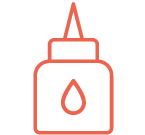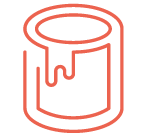Let’s find the right water based emulsions to balance quality, performance & cost
-
Products & Markets
Find Your PolymerCan’t find what you’re looking for? Speak to an ExpertFIND YOUR POLYMER BY MARKET & APPLICATION
- Silicate Paints
- Mosaic Plaster
- Concrete Sealer & Sealants
- Metal & Industrial Coatings
- Interior & Exterior Paints
- Wood & Furniture Coatings
- Penetration Primer & Primers
- Automotive Underbody
- Elastomeric Roof Coatings
- Liquid Applied Sound Damping
- Mulch Coatings
- Thickener
- EIFS & Stucco
- Recreational Surfaces
- About
- Blog
 Construction
Construction
 Nonwovens
Nonwovens
 Adhesives
Adhesives
 Textiles
Textiles
 Printing & Packaging
Printing & Packaging
 Paper
Paper
 Paints & Coatings
Paints & Coatings
 In adhesives intended to be removable it's usually important to have high tack for good initial adhesion, but at the same time peel strength should be low and not build over time so the adhesive can be easily removed. Another important performance requirement is for clean removal of the adhesive with no ghosting or residue. The degree of carboxylation and the glass transition (Tg) of the polymer emulsion will all have an impact on the removability of the adhesive formulation. Non-carboxylated styrene-butadiene latexes tend to have limited adhesion build over time, making them a logical choice in removable adhesive applications.
In adhesives intended to be removable it's usually important to have high tack for good initial adhesion, but at the same time peel strength should be low and not build over time so the adhesive can be easily removed. Another important performance requirement is for clean removal of the adhesive with no ghosting or residue. The degree of carboxylation and the glass transition (Tg) of the polymer emulsion will all have an impact on the removability of the adhesive formulation. Non-carboxylated styrene-butadiene latexes tend to have limited adhesion build over time, making them a logical choice in removable adhesive applications.
